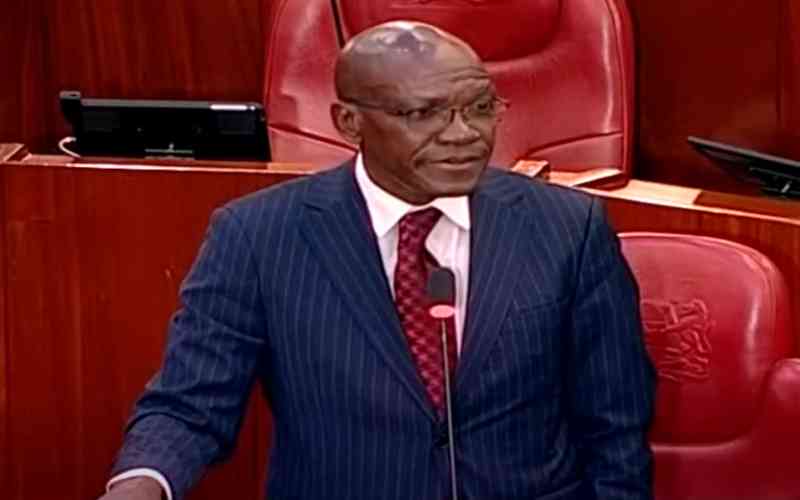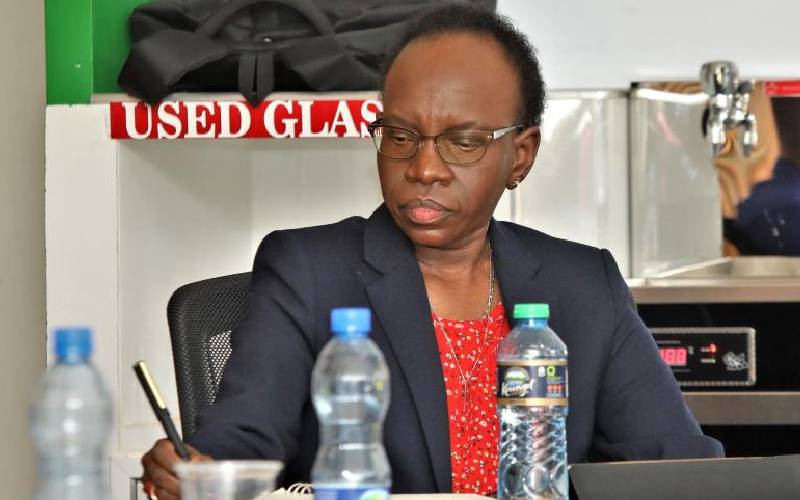 |
|
CROSS-PURPOSE: Parliament has been at odds with Senate over Bills |
By Stephen Makabila
Legislative overlaps between the National Assembly and the Senate are far from over, going by the stand-off over Division of Revenue Bill, for the second year running.
Over the last one year, there have also been duplication of other Bills in the two houses, raising questions as to whether the two were supplementing each other or working at cross-purpose. It came as no surprise when National Assembly Speaker Justin Muturi earlier in the week told Parliament to ignore the Senate on the development of this year’s Bill.
“We will just proceed with our process. What they (Senate) do with the Bill that is before them is up to them,” ruled Muturi in the National Assembly. National Assembly Majority leader Aden Duale told The Standard on Sunday in an interview that Senators have only to deal with the Division of Revenue Bill originating from Parliament and not the Senate.
“We are through with the first and second reading and the senate will receive the message from Speaker Muturi tomorrow (Monday) which they have to deal with, and if they have any amendments the Bill has to be returned to the National Assembly to for approval,” said Duale. The hardline positions taken by Muturi and Duale, therefore renders irrelevant, the Division of Revenue Bill the Senate had prepared. Duale noted it was only the County Revenue Allocation Bill, which has to originate in Senate, but the National Assembly was yet to receive it.
“These two Bills are crucial because they have to be passed to enable county governments prepare their budgets for 2014/2015,” added Duale. What is happening is a replica of what transpired between the two Houses last year.
On April 29 last year, the National Assembly, under the direction of its Speaker Muturi, published the Division of Revenue Bill and on May 3, 2013, he wrote a letter to the Speaker of Senate Ekwe Ethuro seeking an agreement that this Bill was, in the terms of the Constitution, “a Bill concerning county government.”
The Senate Speaker duly agreed, by his letter of May 9, 2013. The constitutional implication of this was that both the National Assembly and the Senate would participate in the debates on, and the passing of the Bill, for it to become law.
However, the National Assembly after debating and passing the Bill, and forwarding it to the Senate which then made amendments, changed its mind, refused any further co-operation with Senate, and secured the direct assent of the President, making the said Bill an Act of Parliament. Muturi acted on the basis that a Division of Revenue Bill was not, after all, “a Bill concerning county government”, and on this basis excluded the role of Senate.
The move prompted the Senate to move to the Supreme Court for interpretation of the law. The Supreme Court ruled it was unconstitutional for the Speaker of the National Assembly to by-pass the Senatorial process, by not going through the mediation arrangement provided in the Constitution.
And in a new confrontation earlier in the week, the National Assembly on Tuesday demanded to know the circumstances under which the Senate introduced the Bill in their House before it was enacted in theirs. Before the Senate went on recess last week, it introduced the Division of Revenue Bill in their House, alongside the County Allocation of Revenue Bill, which dictates what each of the 47 counties is supposed to get. The move caused disagreement on Tuesday as the Bill came up for debate, with Suba MP John Mbadi seeking to know if it was proper to proceed to the second reading stage before the issue on why a similar Bill was before the Senate had been resolved.
Speaker Muturi, terming Mbadi’s concerns legitimate, demanded to know from Duale whether the Bill before the House had originated from the National Treasury.
Commenced process
“I have looked at the Bill before Senate, and it is similar to the Bill before this House, except for the signature,” said Duale, adding that he did not know why Senate had commenced the process of enacting the law. “The procedure is that once we have passed this Bill here, we would send it to the Senate in the form of a message. Senate would only proceed with the message that we send to them,” said Duale.
Senate Majority Leader Kithure Kindiki had defended the process at Senate, saying it was not driven by any sinister motive, but was only meant to fast track the process of enacting the law, given the time constraints Parliament faces.
Stay informed. Subscribe to our newsletter
“The 30 days required to commit the Bill to the relevant committee and allow for public participation will lapse while we are on recess and when we reconvene for special sitting, we shall resume for the second reading. It is a very noble move,” he said. Kiambu Senator Kimani Wamatangi concurred with Kindiki.
“We now have consensus on the matter. We are only trying to shorten the time to ensure Parliament concludes the Bills on time to prevent a crisis,” said Wamatangi.
 The Standard Group Plc is a
multi-media organization with investments in media platforms spanning newspaper
print operations, television, radio broadcasting, digital and online services. The
Standard Group is recognized as a leading multi-media house in Kenya with a key
influence in matters of national and international interest.
The Standard Group Plc is a
multi-media organization with investments in media platforms spanning newspaper
print operations, television, radio broadcasting, digital and online services. The
Standard Group is recognized as a leading multi-media house in Kenya with a key
influence in matters of national and international interest.
 The Standard Group Plc is a
multi-media organization with investments in media platforms spanning newspaper
print operations, television, radio broadcasting, digital and online services. The
Standard Group is recognized as a leading multi-media house in Kenya with a key
influence in matters of national and international interest.
The Standard Group Plc is a
multi-media organization with investments in media platforms spanning newspaper
print operations, television, radio broadcasting, digital and online services. The
Standard Group is recognized as a leading multi-media house in Kenya with a key
influence in matters of national and international interest.









